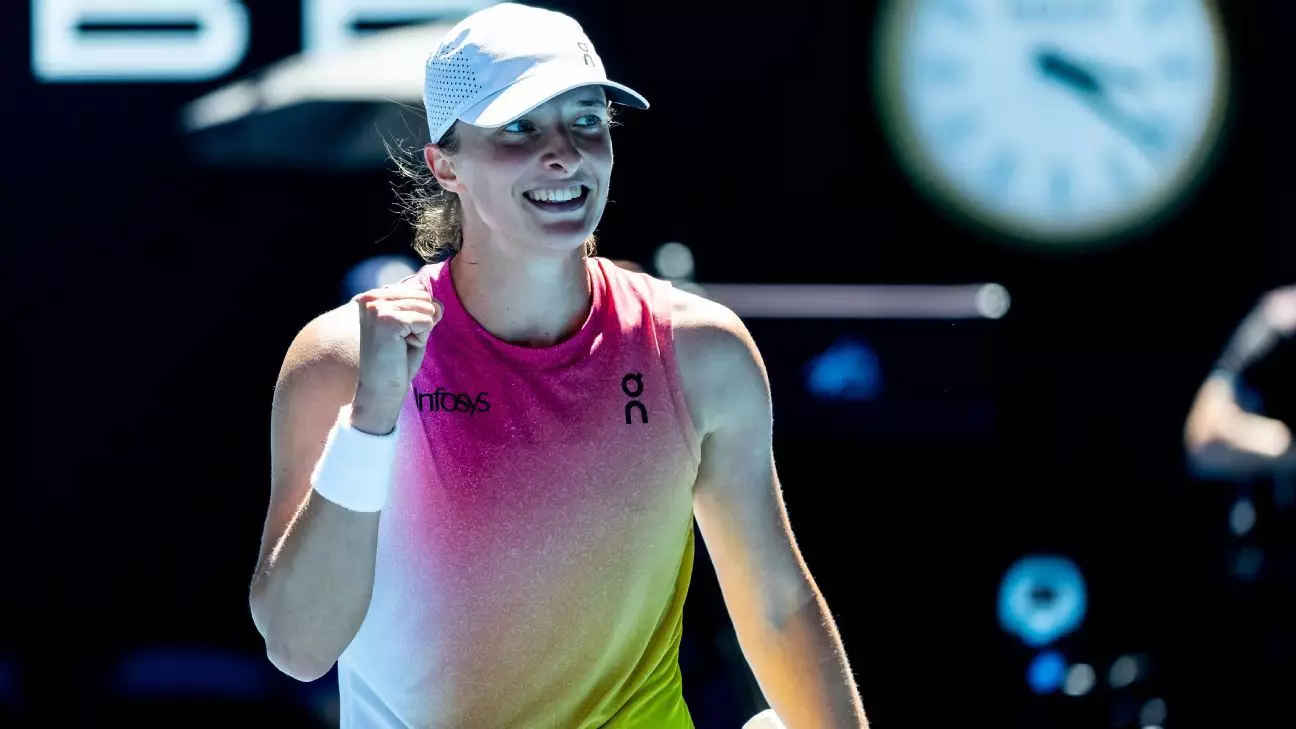Iga Swiatek is proving to be a formidable force at the Australian Open, wielding her racket with exceptional precision and confidence. In the quarterfinals, the Polish star, seeded second, made quick work of Emma Navarro, the eighth seed, with a decisive 6-1, 6-2 victory. Swiatek’s performance in the tournament has been nothing short of impressive; she remains undefeated, having not lost a single set and conceding only 14 games throughout her journey. This noteworthy statistic places her in elite company, as the last woman to advance to the semifinals of the Australian Open with such an astonishingly low number of dropped games was Maria Sharapova in 2013.
Swiatek expressed her satisfaction with her progress, stating, “I’m really happy with the tournament overall.” Her anticipation for the upcoming match against Madison Keys reveals her determination, as she looks to solidify her position for a chance to claim her first title in Melbourne and a sixth Grand Slam trophy overall. Despite her easy victory on paper, she humbly noted the true nature of the match: “Well, I think it was much more tougher than the score says. Emma’s a fighter… and I wanted to stay focused and keep my intensity.” This perspective highlights Swiatek’s mental fortitude and respect for her opponents, qualities that are essential in high-stakes competitions.
Madison Keys, who will face Swiatek in the semifinals, has also demonstrated considerable skill and endurance. The 19th seed emerged victorious from a challenging match against Elina Svitolina, overcoming an initial setback to secure a 3-6, 6-3, 6-4 victory. This match marks Keys’ third semifinal appearance at the Australian Open, underscoring her growing prowess on the grand stage. Notably, the American has shifted her strategy over the course of her career. “I think I play a little bit smarter for sure… probably a little bit less fearless,” she remarked, indicating a maturation in her playing style.
Keys’ recent success is bolstered by her new racket and an impressive ten-match winning streak, which includes a hard-court title in Adelaide earlier this season. Her journey to the semifinals at Melbourne Park has been marked by notable victories against seasoned players, including former Australian Open finalists Danielle Collins and Elena Rybakina. Despite being aware of her past semifinal losses to champions such as Serena Williams and Ashleigh Barty, Keys remains optimistic. She commented, “Madison is a great player and experienced, so you never know,” reminding us of the unpredictability that often characterizes tennis matches.
Keys’ victory over Svitolina also illustrated her tactical acuity. After falling behind in the first set, she made crucial adjustments, taking more aggressive approaches to the net and winning an impressive 23 out of 26 points when she moved forward. This kind of strategic movement is essential, particularly when facing opponents who are adept at baseline rallies. In total, Keys achieved 49 winners, including 23 from her powerful forehand. However, her initial struggles in return games posed a challenge; she had to convert her seventh break point to establish a lead in the second set.
As the semifinals loom, Keys will need to draw upon her tactical flexibility and experience to pose a challenge to Swiatek. “Iga is tough to beat, because she has a lot of spin, kind of naturally, on both sides,” Keys acknowledged. “She’s a good server. She’s a good returner. She moves incredibly well.” These candid observations reveal the respect Keys has for Swiatek’s abilities, which are indeed formidable.
As the tournament progresses, one can’t help but be excited about the impending clash between Swiatek and Keys. Both players bring unique strengths and strategies to the court, setting the stage for a thrilling competition. Will Swiatek’s unprecedented dominance continue? Or will Keys’ strategic mastery and newfound confidence see her through to the final? Only time will tell, but as the Australian Open unfolds, one thing is for certain: tennis fans are in for an exhilarating show.

